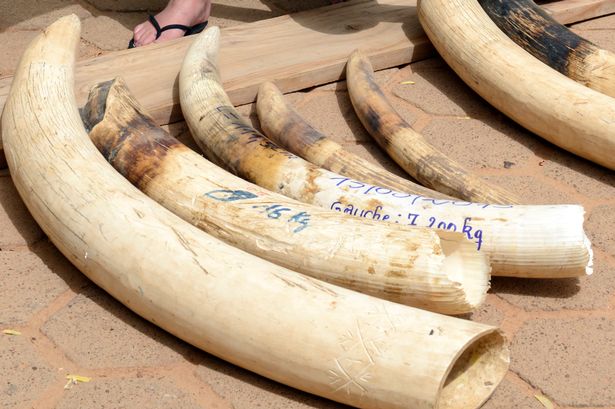Two poachers who tried to sell nine pieces of elephant tusks to undercover police and Kenya Wildlife Service officers have been fined Sh2 million each, or face five years in jail.
Meru Chief Magistrate Dominica Nyambu found Joseph Nyeere Mutea alias George and Edward Kaburu Nyaga guilty of dealing in and being in possession of endangered wildlife trophies.
A third suspect, Samuel Avasirwa Masimbi was not sentenced as he absconded after being released on an Sh2 million bond or a cash bail of Sh750,000.
The three had presented 22 kilogrammes of the nine elephant tusks to Corporal Nicholas Munene and KWS warden Michael Bett and asked for Sh3.3 million after a protracted negotiation.
In a sting operation conducted by officers from the KWS investigation unit based at Lang’ata, Nairobi, the suspects believed that the government officers were in the ivory trade.
The sleuths had received a tip-off from an informer that the suspects had extracted tusks from six elephants and were looking for buyers.
They were informed that the tusks were from five adult elephants and a young one and were hidden in a house near the Meru national park.
The two officers then initiated a meeting with the poachers at the then-Meru Safari Hotel before they gained their confidence and agreed to show them where the tusks were hidden.
After the undercover officers agreed to pay the Sh3.3 million the poachers were asking, Mutea was tasked to take Mr Munene to where the ivory was hidden.
Masimbi remained with Mr Bett at the hotel as a sign of goodwill.
Nine tusks
Unknown to the suspects, the vehicle they rode on belonged to KWS and on arrival, Nyaga brought the nine tusks to a bushy area using a motorcycle.
They then proceeded to a house they believe belonged to Mutea, where they weighed the illegal game trophy and were loaded into the government vehicle.
The officers together with the poachers travelled back to Meru town where upon arrival at the hotel, other officers emerged at the entrance and arrested the three.
Mr Munene then revealed his true identity to the bewildered suspects who had expected to receive the money.
During the hearing, the prosecution led by State Counsel Victorine Kitoto detailed the October 8, 2016 sting operation carried out at around 10 am.
Following the arrests, the items were sent to the National Museum of Kenya to ascertain whether the consignment was indeed a game trophy.
National Museum of Kenya head of Osteology Dr Ogeto Mwebi testified that the exhibits presented to him included nine ivory pieces and a carved elephant bone.
While making the sentence, Ms Nyambu decried the illegal killing of endangered wildlife that were a backbone of Kenya’s tourism sector.
“The nine unprocessed elephant tusks recovered were from six individuals consisting of one juvenile and six adults. This means that six elephants were killed to obtain the ivory.
“A deterrent sentence is called for to deter other like-minded individuals from committing similar offences,” she ruled.
The magistrate at the same time gave the poachers 14 days within which they could appeal the sentence.



